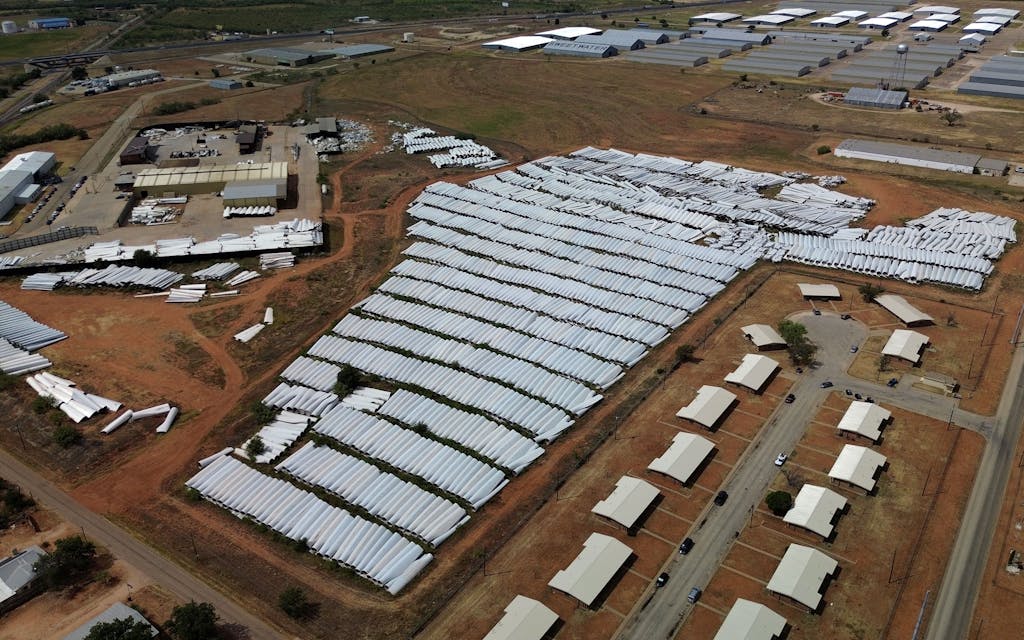Thousands of Old Wind Turbine Blades Pile Up in West Texas.
Officials in Sweetwater say an out-of-state company has made their town a dump for the seldom-seen trash created by renewable energy.
Every year since 1958, the West Texas town of Sweetwater has hosted the World’s Largest Rattlesnake Roundup, which is exactly what it sounds like. Thousands of the venomous ophidians are rooted out of their dens and brought to the Nolan County Coliseum to be gawked at, “milked,” and often beheaded and skinned. It started as a way for the region to rid itself of some of its least-welcome residents. Now community leaders wish they could do the same with several giant piles of scrap that have for too long been left to bake in the sun. But that’s proving to be much trickier than wrangling reptiles.
About forty miles west of Abilene on Interstate 20, Sweetwater has unwittingly become home to what is possibly the world’s largest collection of unwanted wind turbine blades. When forklifts deposited the first of these in a field behind the apartment complex where Pamala Meyer lives, on the west side of town, in 2017, she wasn’t initially bothered. But then the blades—between 150 and 200 feet in length and mostly made of composite materials such as fiberglass with a binding resin—kept coming. Each was cut into thirds, with each segment longer than a school bus. Thousands arrived over several years, eventually blanketing more than thirty acres, in stacks rising as high as basketball backboards. Every few dozen feet, a break among the stacks leads into an industrial hedge maze.
“It’s just a hazard all the way around,” Meyer said. She worries about neighborhood children exploring the unfenced piles and says that stagnant pools of water inside the blades breed swarms of mosquitos. Matt Jackson, who works in a nearby warehouse, has other concerns. The piles create shaded nooks and crannies, perfect for Sweetwater’s unofficial mascot. “It’s just a big rattlesnake farm,” he said.

The blades were brought here by Global Fiberglass Solutions, a company based in Washington State that announced in 2017 its intention to recycle blades from wind farms across the region. Instead of ending up in landfills, they would be ground up into a reusable material that could be turned into pallets, railroad ties, or flooring panels. Global Fiberglass is one of a few companies attempting to develop a viable business from recycling blades.
Besides the main boneyard—behind Meyer’s apartment—stacks of blades also occupy ten acres a couple miles south of town, and the company is storing blades in other locations in the county. “They have, in my view, abandoned them there,” said Samantha Morrow, the Nolan County attorney. “The county doesn’t have and cannot find millions of dollars to clean this up.”
The Sweetwater piles are also at least partly the indirect result of a rule clarification the Internal Revenue Service issued in 2016. Before then, a wind farm could collect valuable federal tax credits for only its first ten years of operation. But the IRS determined that it would restart the clock on the credits if a wind farm “repowered” its turbines—replacing most of their equipment with newer parts. So, despite the expected two-decade lifespan for turbine blades, wind farms across Texas and other states began replacing many that remained in good shape years early.
Some paid Global Fiberglass to remove the older blades and haul them away. The company set up shop in an empty industrial facility in Sweetwater that was once an aluminum recycling plant, but Don Lilly, the managing director of Global Fiberglass, told me that only a handful of blades have ever been ground up there. He said the company was close to ramping up and would soon mill the blades into pieces the size of coarse sand. “The blade material is sold,” he said, “but I can’t go into that part yet.”
Sweetwater has heard such pledges before. The county declared the stockpile a public nuisance a year ago. City attorney Jeff Allen said Sweetwater’s local ordinances are aimed at overgrown lots, not turbine blades, leaving the city with limited legal options. He said he believes Global Fiberglass “intended to be a viable business” but at some point “it just came off the rails.” (Lilly disputes this and says the delays have come from ensuring “all systems were engineered.”)
Sweetwater benefits from the wind-energy industry, including two large wind farms nearby. Drivers arriving on I-20 from either direction are welcomed by a giant wind turbine blade painted with the town’s name. But even the community’s biggest boosters of renewable energy long ago ran out of patience with Global Fiberglass’s mess. “We’d like to see them gone,” said Karen Hunt, director of the local chamber of commerce. “The sooner the better.”
Update, September 25: General Electric filed a lawsuit last week claiming that Global Fiberglass Solutions has failed to fulfill its promise to recycle thousands of blades. GE says it paid the company $16.9 million to recycle about five thousand wind turbine blades, but that GFS instead stockpiled them at facilities in Sweetwater and Iowa. “Only after GFS took millions of dollars from GE, did GFS all but shut down its operations without recycling the Blades,” reads the complaint, filed in U.S. district court in New York.
GE says it later contracted with another company to recycle its blades and is seeking damages to cover these costs as well as reputational damage. Global Fiberglass has not responded to the lawsuit. GE removing its blades from Sweetwater wouldn’t clean up the giant dump; blades manufactured by other companies would still remain.


